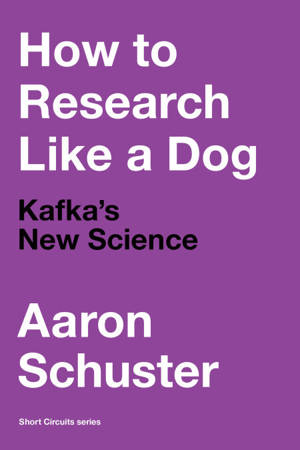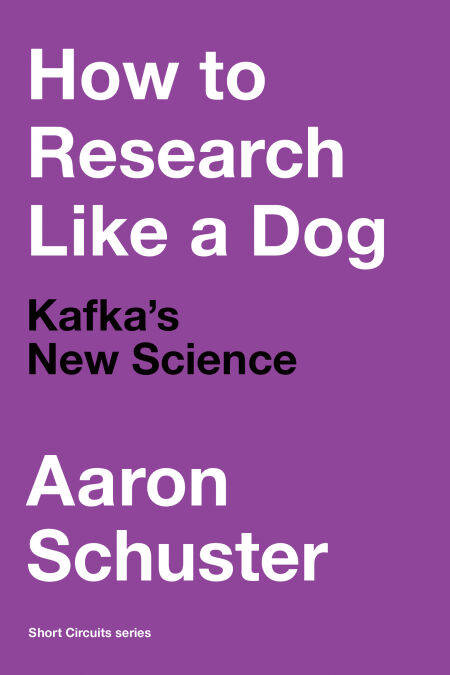
Bedankt voor het vertrouwen het afgelopen jaar! Om jou te bedanken bieden we GRATIS verzending (in België) aan op alles gedurende de hele maand januari.
- Afhalen na 1 uur in een winkel met voorraad
- In januari gratis thuislevering in België
- Ruim aanbod met 7 miljoen producten
Bedankt voor het vertrouwen het afgelopen jaar! Om jou te bedanken bieden we GRATIS verzending (in België) aan op alles gedurende de hele maand januari.
- Afhalen na 1 uur in een winkel met voorraad
- In januari gratis thuislevering in België
- Ruim aanbod met 7 miljoen producten
Zoeken
Omschrijving
A provocative book that proposes a new and surprising inspiration for philosophy today—the canine thinker from Kafka’s story “Investigations of a Dog.”
Written toward the end of Kafka’s life, “Investigations of a Dog” (Forschungen eines Hundes, 1922) is one of the lesser-known and most enigmatic works in the author’s oeuvre. Kafka’s tale of philosophical adventure is that of a lone, maladjusted dog who challenges the dogmatism of established science and pioneers an original research program in pursuit of the mysteries of his self and his world. In How to Research Like a Dog, Aaron Schuster uses the canine as a guide dog to rediscover Kafka’s fictional universe, while taking up the cause of this ingenious, possessed, melancholy, comical, and revolutionary thinker.
Neither an exercise in literary criticism nor a traditional philosophical commentary, this charming and idiosyncratic book aligns itself with the research program of Kafka’s dog. It constructs an “impossible” system based on the fourfold division of nourishment, music, incantation, and freedom—or, stated a bit differently: enjoyment, art, institutions, and freedom. From Plato to Flaubert, Lispector, and Lacan, Schuster puts the dog in dialogue with psychoanalytic theory, the history of philosophy, and modern literature. Imagining the “Unknown University” that Kafka’s new science calls for, the book enlists new comrades in the dog’s struggle.
Written toward the end of Kafka’s life, “Investigations of a Dog” (Forschungen eines Hundes, 1922) is one of the lesser-known and most enigmatic works in the author’s oeuvre. Kafka’s tale of philosophical adventure is that of a lone, maladjusted dog who challenges the dogmatism of established science and pioneers an original research program in pursuit of the mysteries of his self and his world. In How to Research Like a Dog, Aaron Schuster uses the canine as a guide dog to rediscover Kafka’s fictional universe, while taking up the cause of this ingenious, possessed, melancholy, comical, and revolutionary thinker.
Neither an exercise in literary criticism nor a traditional philosophical commentary, this charming and idiosyncratic book aligns itself with the research program of Kafka’s dog. It constructs an “impossible” system based on the fourfold division of nourishment, music, incantation, and freedom—or, stated a bit differently: enjoyment, art, institutions, and freedom. From Plato to Flaubert, Lispector, and Lacan, Schuster puts the dog in dialogue with psychoanalytic theory, the history of philosophy, and modern literature. Imagining the “Unknown University” that Kafka’s new science calls for, the book enlists new comrades in the dog’s struggle.
Specificaties
Betrokkenen
- Auteur(s):
- Uitgeverij:
Inhoud
- Aantal bladzijden:
- 352
- Taal:
- Engels
- Reeks:
Eigenschappen
- Productcode (EAN):
- 9780262369152
- Verschijningsdatum:
- 9/12/2024
- Uitvoering:
- E-book
- Beveiligd met:
- Adobe DRM
- Formaat:
- ePub

Alleen bij Standaard Boekhandel
+ 34 punten op je klantenkaart van Standaard Boekhandel
Beoordelingen
We publiceren alleen reviews die voldoen aan de voorwaarden voor reviews. Bekijk onze voorwaarden voor reviews.









